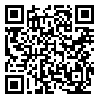BibTeX | RIS | EndNote | Medlars | ProCite | Reference Manager | RefWorks
Send citation to:
URL: http://mjiri.iums.ac.ir/article-1-3554-en.html
Background: The most important responsibilities of an education system are to create self-directed learning opportunities and develop the required skills for taking the responsibility for change. The present study aimed at determining the impact of a learning contract on self-directed learning and satisfaction of nursing students.
Methods: A total of 59 nursing students participated in this experimental study. They were divided into six 10-member groups. To control the communications among the groups, the first 3 groups were trained using conventional learning methods and the second 3 groups using learning contract method. In the first session, a pretest was performed based on educational objectives. At the end of the training, the students in each group completed the questionnaires of self-directed learning and satisfaction. The results of descriptive and inferential statistical methods (dependent and independent t tests) were presented using SPSS.
Results: There were no significant differences between the 2 groups in gender, grade point average of previous years, and interest toward nursing. However, the results revealed a significant difference between the 2 groups in the total score of self-directed learning (p= 0.019). Although the mean satisfaction score was higher in the intervention group, the difference was not statistically significant.
Conclusion: This study suggested that the use of learning contract method in clinical settings enhances self-directed learning among nursing students. Because this model focuses on individual differences, the researcher highly recommends the application of this new method to educators.
| Rights and permissions | |
 |
This work is licensed under a Creative Commons Attribution-NonCommercial 4.0 International License. |







